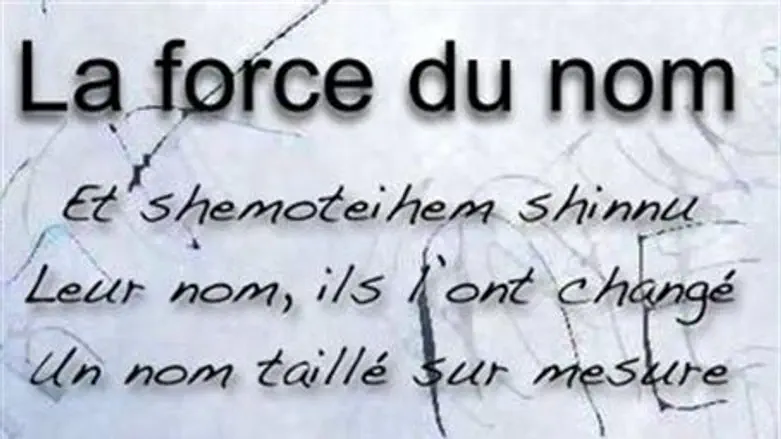
A French organization named “The Strength of the Name” has been formed to help Jews change their French last names to their original Jewish ones.
No one knows why it is happening precisely now, but some 30 French Jews have decided the time has come for them to restore their Jewish family names. Kim Willsher, reporting for the Los Angeles Times, writes that after World War II, French officials urged Jewish immigrants to change their names to better blend in with French society. Though they were not obligated, their experiences during World War II intimidated most of them into doing so.
Thus, Benjamin Fajnzylber (Feinzilber) became Benjamin Fazel, the Rozenkopfs became the Rosents, the Frankensteins turned into Franiers, and the Wolkowiczs - the Volcots.
Now, Michael Wolkowicz – a psychoanalyst and Associate Professor at the Universities of Paris , Tel Aviv, and Glasgow – is among the leaders of the new campaign to recover old Jewish names. The problem is that French law stipulates that though "foreign sounding" family names may be changed to those that sound more “French-like,” once they are changed, they are not permitted to be changed back again.
Another leader of the drive is Celine Masson, also a psychoanalyst and a Professor at the University Paris-Diderot. She actually founded the La Force du Nom (The Strength of the Name) organization, together with French lawyer Nathalie Felzenszwalbe, whose family never changed its original name. Masson’s family was originally surnamed Hassan, before moving to France in the 1960s in a wave of Jewish immigration from Tunisia. “French officials suggested making the name sound more French-sounding,” Willsher reports, and “while not forced to change, Celine Masson's father agreed to do so.”
"There was a lot of anti-Semitism in those days," Celine says. "I was born a Masson, but the name means nothing. It carries no history, it says nothing about my family, my roots, where we came from."
Jeremie Fazel, too – the grandson of Benjamin – has decided to try to change his name back to Feinzilber. His current last name “doesn't feel right; it says nothing about my family or our history."
Cyril Aslanov, Associate Professor of Linguistics at the Hebrew University of Jerusalem and expert on the history of Jewish and formerly-Jewish surnames, is also a leading member of the organization.
Hundreds of thousands of Jews, most of them Holocaust survivors, arrived in France in the 1940s and '50s. “Mainly poor and stateless,” Willsher writes, “and fearful of latent anti-Semitism in a country from which 76,000 Jews were dispatched to concentration camps, most were just grateful to be allowed to stay. There was no legal obligation for them to drop their family names, but they often were encouraged to do so.”
“The Strength of the Name” has submitted requests for name-changes to the State Council, which has said it will deal with them individually. Though the "Strength of the Name" people do not believe the law against restoring family names can be revoked, they are hoping that exceptions will be made for them, paving the way for many other Jews to restore their original names.
"Everyone needs to know where they come from,” says Fazel. “A family's name is part of the compass in life.”